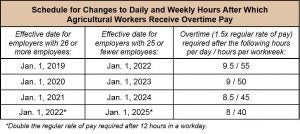The Labor Commissioner’s Office has posted guidance for agricultural employers and workers on an overtime pay schedule that went into effect Jan. 1. The law’s overtime pay requirements will be phased in according to the table below.
“We encourage large and small agricultural employers in the state to note the new farmworker overtime pay requirements that will phase in until a 40-hour standard workweek is reached,” said California Labor Secretary Julie A. Su.

For pre-existing overtime requirements for agricultural workers, including on the seventh day of work in a workweek, please see Wage Order 14.
The daily and weekly thresholds at which agricultural workers receive overtime pay will phase-in according to the following schedule:
For the first year of the phase-in, agricultural workers at large businesses earn overtime pay for all hours worked over 9.5 hours in a day or over 55 hours in a workweek. Small employers have an additional three years before the changes to daily and weekly overtime pay take effect.
The Labor Commissioner’s Office has also posted answers to frequently asked questions regarding overtime for agricultural workers.
Agricultural workers are defined in Wage Order 14 and include employees who are engaged in the preparation and treatment of farmland as well as the care and harvesting of crops. Agricultural workers include employees engaged in sheepherding, irrigation, and licensed crew members on commercial fishing vessels.
Workers who do not receive proper overtime and other pay can file a wage claim with the Labor Commissioner’s Office to begin the process to recover unpaid wages and penalties. Failure to pay proper overtime can result in a civil penalty of $50 per pay period for each underpaid employee.
The Department of Industrial Relations’ Division of Labor Standards Enforcement, or the California Labor Commissioner’s Office, combats wage theft and conducts on-site inspections to investigate and enforce compliance with minimum wage and other California labor laws. Its wide-ranging responsibilities include public works enforcement, retaliation complaint investigations, licensing and registration, as well as multilingual labor law education and outreach for workers and employers.


